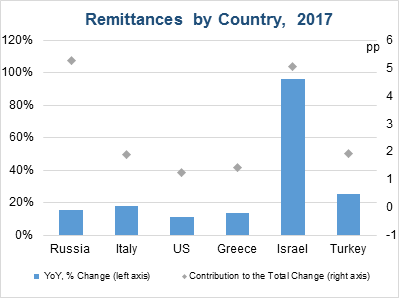- Details
According to NBG, the volume of total remittances to Georgia amounted to 1,379 million USD in 2017, a 19.8% YoY increase. The recovery of remittances is a clear sign that the economies of Georgia’s partner countries continue to improve. All top source countries of money inflows to Georgia showed a notable increase: Russia (+15.4% YoY), Italy (+17.9% YoY), the United States (+11.2% YoY) and Greece (+13.4% YoY).
Money inflows from Israel showed unprecedented annual growth of 96.1%. This stemmed from the wave of Georgian emigration that started after the countries ratified a visa-free regime in November 2013. Georgian citizens are allowed to stay in Israel without a visa for a maximum of 90 days in any six-month period. In that year only four Georgian citizens sought asylum in Israel, whereas in 2015 the number was more than 700, and about 6,000 in the following year. However, the situation has recently changed. First, there has been an increase in the number of Georgian citizens denied entry to Israel at the border. Secondly, in February 2017 the Ministry of Internal Affairs of Israel recognized Georgia as “a safe country”.
- Details
On Thursday, February 15, ISET hosted Dr. Vytautas Kuokštis, an Associate Professor at Vilnius University and the Institute of International Relations and Political Science. Dr. Kuokštis gave a presentation entitled “The Political Economy of Internal Adjustment in the Baltics in 2008-10 in the Light of Models of Currency Crises”.
This presentation was focused on the Baltic countries' experience during the Global Recession in 2008-10, and how the nations reacted. The global financial crisis hit the Baltic States much harder than other countries in the EU: Estonia, Latvia and Lithuania all faced a very deep economic downturn, with many outside observers predicting they would devalue and/or default; in other words, they these countries would fail to implement the strategy of internal devaluation/adjustment.












